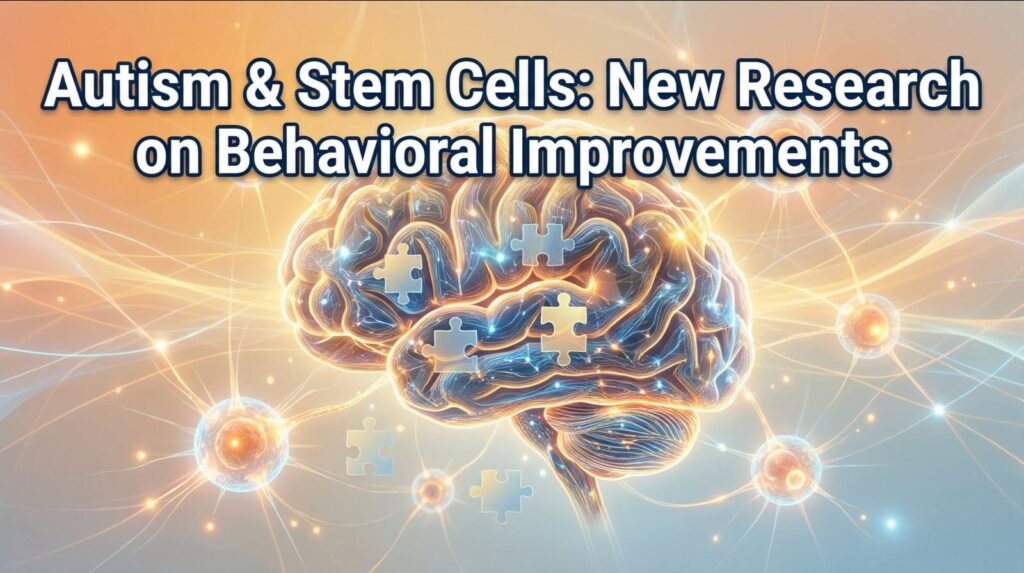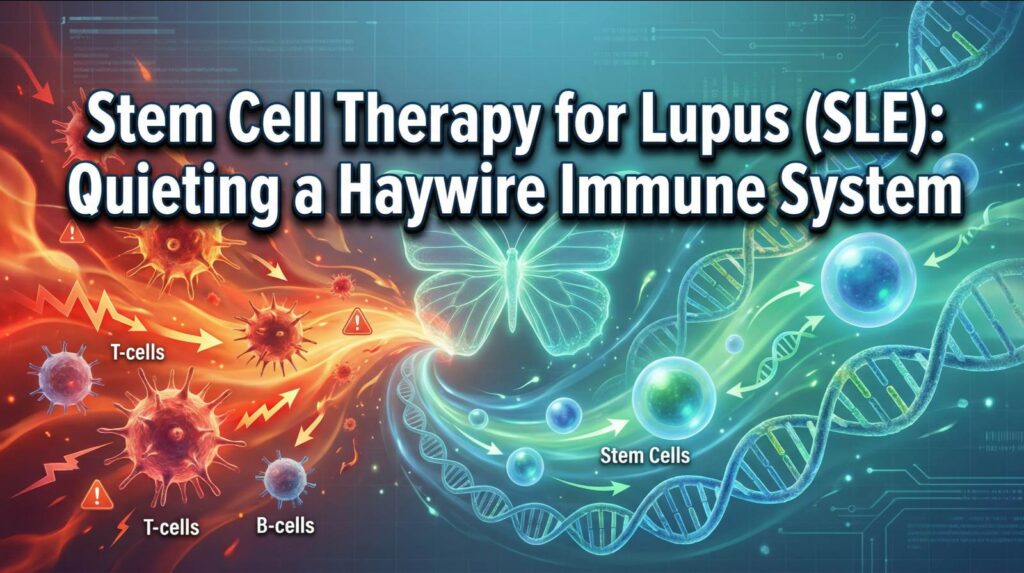What is Regenerative Medicine and How Does it Relate to Age-Related Diseases?
Have you ever wondered if we could turn back the clock on aging? Imagine a world where we could repair or replace damaged tissues and organs, effectively reversing the effects of aging. This isn’t science fiction—it’s the promise of regenerative medicine.
Regenerative medicine is a groundbreaking field that focuses on harnessing the body’s natural ability to heal itself. It involves the use of stem cells, tissue engineering, and gene therapies to restore or replace damaged tissues and organs. This approach is particularly promising for age-related diseases, which are conditions that become more prevalent as we age, such as cardiovascular disease, Alzheimer’s disease, and osteoporosis.
As we age, our body’s ability to regenerate naturally diminishes. This decline leads to the accumulation of senescent cells—cells that have stopped dividing and contribute to aging and disease. Regenerative medicine aims to counteract this process by introducing new, healthy cells to replace the old, damaged ones. This could potentially slow down or even reverse the aging process.
Understanding the Role of Stem Cells in Regenerative Medicine
Stem cells are the unsung heroes of regenerative medicine. These remarkable cells have the unique ability to develop into various cell types, making them ideal for repairing and regenerating tissues. There are several types of stem cells, including embryonic stem cells, adult stem cells, and induced pluripotent stem cells (iPSCs).
Embryonic stem cells are derived from early-stage embryos and can develop into any cell type in the body. Adult stem cells, found in tissues like bone marrow and adipose tissue, are more limited in their differentiation potential but are still incredibly valuable. iPSCs are adult cells that have been reprogrammed to an embryonic-like state, giving them the versatility of embryonic stem cells without the ethical concerns.
In regenerative medicine, stem cells can be used in various ways:
- Stem cell therapy: Transplanting stem cells into damaged tissues to promote healing.
- Tissue engineering: Creating bioengineered tissues and organs using stem cells and scaffolds.
- Gene therapy: Modifying stem cells to correct genetic defects.
These approaches hold immense potential for treating age-related diseases by replenishing damaged tissues and restoring normal function.
Exploring the Link Between Aging-Related Conditions and Regenerative Therapies
Aging is a complex process that affects every cell, tissue, and organ in the body. As we age, our cells lose their ability to divide and repair themselves, leading to the gradual decline in function that characterizes aging-related diseases. Regenerative therapies aim to address the root causes of these conditions by promoting the regeneration of healthy tissues.
For example, stem cell therapy has shown promise in treating cardiovascular diseases by regenerating damaged heart tissue. Similarly, neural stem cells are being explored as a potential treatment for neurodegenerative diseases like Alzheimer’s and Parkinson’s. By replacing damaged neurons and supporting the brain’s natural repair mechanisms, these therapies could significantly improve the quality of life for patients with these debilitating conditions.
The Promise of Stem Cell Therapy in Addressing Age-Related Ailments
Stem cell therapy is at the forefront of regenerative medicine, offering hope for a wide range of age-related ailments. Mesenchymal stem cells (MSCs), in particular, have shown great potential due to their ability to differentiate into various cell types, including bone, cartilage, and muscle cells.
MSCs can be isolated from several sources, including bone marrow, adipose tissue, and umbilical cord blood. These cells have been used in clinical trials to treat conditions such as osteoarthritis, cardiovascular disease, and neurodegenerative diseases. The results have been promising, with many patients experiencing significant improvements in symptoms and overall function.
One of the key advantages of stem cell therapy is its ability to target the underlying causes of age-related diseases rather than just alleviating symptoms. By promoting the regeneration of healthy tissues, stem cell therapy has the potential to provide long-lasting relief and improve the quality of life for aging individuals.
What Are the Latest Advancements in Regenerative Medicine Research?
The field of regenerative medicine is constantly evolving, with new advancements being made every day. Recent research has focused on developing more effective and efficient ways to use stem cells and other regenerative therapies to treat age-related diseases.
One exciting area of research is the use of 3D bioprinting to create bioengineered tissues and organs. This technology allows scientists to print complex structures using stem cells and biomaterials, potentially paving the way for the creation of fully functional organs for transplantation.
Another promising development is the use of gene editing technologies like CRISPR-Cas9 to modify stem cells and correct genetic defects. This approach could be used to treat a wide range of genetic disorders and age-related diseases by repairing the underlying genetic mutations.
Insights from Recent Clinical Trials in Regenerative Medicine
Clinical trials are essential for translating the potential of regenerative medicine into real-world treatments. Recent trials have provided valuable insights into the safety and efficacy of various regenerative therapies.
For example, a recent clinical trial using mesenchymal stem cells to treat osteoarthritis showed significant improvements in pain and joint function in patients. Another trial investigating the use of neural stem cells for Parkinson’s disease demonstrated promising results, with patients experiencing improvements in motor function and quality of life.
These trials highlight the potential of regenerative medicine to provide effective treatments for age-related diseases and underscore the importance of continued research and development in this field.
The Impact of Stem Cell-Based Therapies on Vascular Regeneration
Vascular regeneration is a critical area of research in regenerative medicine, particularly for treating cardiovascular diseases. Stem cell-based therapies have shown great promise in promoting the regeneration of blood vessels and improving blood flow to damaged tissues.
Endothelial cells, which line the interior of blood vessels, play a crucial role in vascular health. Stem cells can be used to generate new endothelial cells and promote the formation of new blood vessels, a process known as angiogenesis. This approach has been used in clinical trials to treat conditions such as peripheral artery disease and myocardial infarction, with encouraging results.
Exploring the Potential of Cell-Based Approaches in Regenerative Treatments
Cell-based approaches are at the heart of regenerative medicine, offering a wide range of potential treatments for age-related diseases. These approaches involve the use of various types of cells, including stem cells, to repair or replace damaged tissues and organs.
One promising approach is the use of stem cell-derived exosomes—small vesicles secreted by stem cells that contain proteins, lipids, and RNA. These exosomes can promote tissue regeneration and repair by delivering therapeutic molecules to damaged cells. Research has shown that stem cell-derived exosomes can improve outcomes in conditions such as stroke, heart disease, and neurodegenerative diseases.
How Can Regenerative Medicine Target Age-Related Conditions at a Cellular Level?
Regenerative medicine targets age-related conditions at a cellular level by promoting the regeneration of healthy cells and tissues. This approach involves the use of stem cells, gene therapies, and other regenerative techniques to address the underlying causes of aging and disease.
For example, stem cell therapy can be used to replace damaged cells with new, healthy ones, effectively reversing the effects of aging. Gene therapies can be used to correct genetic defects and promote the regeneration of healthy tissues. These approaches have the potential to provide long-lasting relief from age-related diseases and improve overall health and longevity.
Examining the Role of Mesenchymal Stem Cells in Addressing Aging-Related Diseases
Mesenchymal stem cells (MSCs) play a crucial role in addressing aging-related diseases due to their ability to differentiate into various cell types and promote tissue regeneration. MSCs can be isolated from several sources, including bone marrow, adipose tissue, and umbilical cord blood.
MSCs have been used in clinical trials to treat a wide range of age-related diseases, including osteoarthritis, cardiovascular disease, and neurodegenerative diseases. These trials have shown promising results, with many patients experiencing significant improvements in symptoms and overall function.
Therapeutic Potential of Stem Cell-Derived Treatments for Age-Related Ailments
Stem cell-derived treatments hold immense therapeutic potential for addressing age-related ailments. These treatments involve the use of stem cells and their derivatives, such as exosomes, to promote tissue regeneration and repair.
For example, stem cell-derived exosomes have been shown to improve outcomes in conditions such as stroke, heart disease, and neurodegenerative diseases. These exosomes contain therapeutic molecules that can promote tissue regeneration and repair, providing a promising new approach to treating age-related diseases.
The Impact of Cell Proliferation on Regenerating Tissues in Age-Related Diseases
Cell proliferation is a critical factor in the regeneration of tissues in age-related diseases. As we age, our cells lose their ability to divide and repair themselves, leading to the gradual decline in function that characterizes aging-related diseases.
Stem cell therapy aims to counteract this process by introducing new, healthy cells that can proliferate and replace the damaged ones. This approach has the potential to provide long-lasting relief from age-related diseases and improve overall health and longevity.
What Role Does Clinical Research Play in Advancing Regenerative Therapies for Age-Related Diseases?
Clinical research plays a vital role in advancing regenerative therapies for age-related diseases. Through clinical trials, researchers can evaluate the safety and efficacy of new treatments and gather valuable data to inform future research and development.
Recent clinical studies have provided valuable insights into the potential of regenerative therapies to treat age-related diseases. For example, trials using mesenchymal stem cells to treat osteoarthritis and cardiovascular disease have shown promising results, with many patients experiencing significant improvements in symptoms and overall function.
Key Findings from Randomized Clinical Studies on Stem Cell Therapies
Randomized clinical studies are essential for evaluating the safety and efficacy of stem cell therapies. These studies provide valuable data that can inform future research and development and help bring new treatments to market.
Recent randomized clinical studies have shown promising results for stem cell therapies in treating age-related diseases. For example, a study using mesenchymal stem cells to treat osteoarthritis showed significant improvements in pain and joint function in patients. Another study investigating the use of neural stem cells for Parkinson’s disease demonstrated promising results, with patients experiencing improvements in motor function and quality of life.
The Future of Regenerative Medicine: Insights from Clinical Trials on Age-Related Conditions
The future of regenerative medicine is bright, with ongoing clinical trials providing valuable insights into the potential of new treatments for age-related conditions. These trials are essential for evaluating the safety and efficacy of new therapies and bringing them to market.
Recent clinical trials have shown promising results for a wide range of age-related conditions, including cardiovascular disease, neurodegenerative diseases, and osteoarthritis. These trials highlight the potential of regenerative medicine to provide effective treatments for age-related diseases and underscore the importance of continued research and development in this field.
Uncovering the Prerequisites for Successful Regenerative Treatments in Age-Related Diseases
Successful regenerative treatments for age-related diseases require a deep understanding of the underlying biology and the development of effective and efficient therapies. This involves identifying the right types of stem cells, developing effective delivery methods, and ensuring the safety and efficacy of new treatments.
Recent research has provided valuable insights into the prerequisites for successful regenerative treatments. For example, studies have shown that mesenchymal stem cells are particularly effective for treating age-related diseases due to their ability to differentiate into various cell types and promote tissue regeneration. Additionally, advancements in gene editing and 3D bioprinting have opened new avenues for developing effective regenerative therapies.
How Can Stem Cell-Based Therapies Address Specific Age-Related Disorders?
Stem cell-based therapies have the potential to address a wide range of age-related disorders by promoting the regeneration of healthy tissues and organs. These therapies involve the use of various types of stem cells, including mesenchymal stem cells, neural stem cells, and induced pluripotent stem cells (iPSCs).
For example, mesenchymal stem cells have shown promise in treating osteoarthritis by regenerating damaged cartilage and improving joint function. Neural stem cells are being explored as a potential treatment for neurodegenerative diseases like Alzheimer’s and Parkinson’s, with the goal of replacing damaged neurons and supporting the brain’s natural repair mechanisms.
Regenerative Potential of Mesenchymal Stem Cells in Bone Marrow Diseases Associated with Aging
Mesenchymal stem cells (MSCs) have shown great potential in treating bone marrow diseases associated with aging. These cells can differentiate into various cell types, including bone, cartilage, and muscle cells, making them ideal for promoting tissue regeneration and repair.
MSCs can be isolated from several sources, including bone marrow, adipose tissue, and umbilical cord blood. These cells have been used in clinical trials to treat conditions such as osteoporosis and bone marrow failure, with promising results. By promoting the regeneration of healthy bone and cartilage, MSCs have the potential to provide long-lasting relief from bone marrow diseases associated with aging.
The Role of Neural Stem Cells in Counteracting Age-Related Cognitive Decline
Neural stem cells play a crucial role in counteracting age-related cognitive decline by promoting the regeneration of damaged neurons and supporting the brain’s natural repair mechanisms. These cells can differentiate into various types of brain cells, making them ideal for treating neurodegenerative diseases like Alzheimer’s and Parkinson’s.
Recent research has shown that neural stem cells can improve cognitive function and reduce symptoms in patients with neurodegenerative diseases. By replacing damaged neurons and supporting the brain’s natural repair mechanisms, these cells have the potential to provide long-lasting relief from age-related cognitive decline.
Cardiac Regeneration through Stem Cell Therapies: Implications for Age-Related Heart Conditions
Cardiac regeneration through stem cell therapies holds great promise for treating age-related heart conditions. Stem cells can be used to regenerate damaged heart tissue and improve heart function, providing a potential treatment for conditions such as heart failure and myocardial infarction.
Recent clinical trials have shown promising results for stem cell therapies in treating age-related heart conditions. For example, a trial using mesenchymal stem cells to treat heart failure showed significant improvements in heart function and quality of life in patients. By promoting the regeneration of healthy heart tissue, stem cell therapies have the potential to provide long-lasting relief from age-related heart conditions.
Conclusion
Regenerative medicine offers unprecedented potential for addressing age-related diseases by targeting the root causes of tissue and organ decline. Through the use of stem cells, tissue engineering, and gene therapies, regenerative medicine aims to restore or enhance the body’s natural healing processes. While challenges remain, ongoing research and clinical trials continue to advance our understanding of regenerative medicine’s potential in combating age-related diseases. As the field progresses, a multidisciplinary approach involving scientists, clinicians, ethicists, and policymakers will be essential to ensure the responsible and equitable integration of regenerative therapies into mainstream healthcare, ultimately enhancing the quality of life for aging populations worldwide.
For more information on the latest advancements in regenerative medicine, check out these resources and clinical trials.



